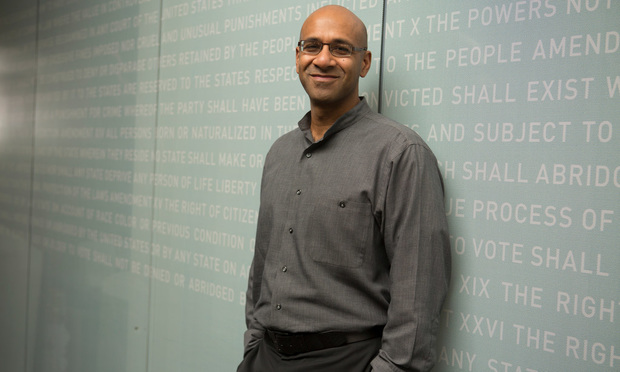Ninth Circuit Hears Immigration Case That Could Threaten Civil Rights Class Actions
The U.S. Court of Appeals for the Ninth Circuit heard oral arguments on Monday in a class action alleging that immigrant detainees have been deprived of their constitutional right to a bond hearing.
October 31, 2018 at 07:16 PM
6 minute read
 Ahilan Arulanantham, 2016 MacArthur Fellow, ACLU Southern California Offices.
Ahilan Arulanantham, 2016 MacArthur Fellow, ACLU Southern California Offices.
A federal appeals court heard oral arguments this week in a case that challenges the use of class actions in civil rights lawsuits alleging procedural due process violations.
The class action, which the American Civil Liberties Union of Southern California brought 11 years ago, alleges that immigrant detainees have been deprived of their constitutional right to a bond hearing. But much of the arguments on Monday before the U.S. Court of Appeals for the Ninth Circuit focused on whether the Federal Rule 23 of Civil Procedure, which governs class actions, could be applied when the alleged due process violations may be too varied as to each detainee in order to establish commonality.
That question came from the U.S. Supreme Court in a Feb. 27 order remanding the case back to the Ninth Circuit.
Ahilan Arulanantham, senior counsel at the ACLU of Southern California, who argued for the detainee plaintiffs on Monday, said there was no a “plausible argument” against the use of class actions. But if the Ninth Circuit disagrees, it could have “massive implications” on civil rights class actions.
“It is a very big generalization,” he said. “If true, it would also be true of so many contexts in which due process cases have traditionally been resolved on a class basis.”
Steve Stafford, a spokesman for the U.S. Department of Justice, which represented several immigration officials named as defendants in the case, declined to comment.
At oral arguments, and in court documents, Assistant U.S. Attorney Sarah Stevens Wilson told the appeals panel that the various detainees in the case were far too dissimilar to pursue their claims as a class.
“The individual characteristics of the members of the subclass and the varied procedural protections available to them make it impossible for the court to answer the due process question the same way for each of them,” she wrote in an Aug. 8 supplemental memo. “These factual differences prevent deciding or remedying the due process claim in a common manner.”
The case, Rodriguez v. Marin, delves into a lesser-known provision of Rule 23 used in civil rights cases, often to seek injunctive or declaratory relief rather than monetary damages. Rule 23(b)(2) allows class actions if “the party opposing the class has acted or refused to act on grounds that apply generally to the class, so that the final injunctive relief or corresponding declaratory relief is appropriate respecting the class as a whole.”
The ACLU's case, which is limited to immigrant detainees in the Central District of California, used that provision of Rule 23 to pursue four subclasses of detainees based on the statutes under which immigration officials detained them. Those included noncitizens convicted of certain crimes and those seeking asylum. The case brought claims under both the Fifth Amendment's due process provision and U.S. immigration law.
Monday's argument is the fourth time the Ninth Circuit has heard the case. In 2009, the Ninth Circuit reversed denial of class certification in the case and, in 2013, affirmed a preliminary injunction. In 2015, the Ninth Circuit granted an injunction that forced immigration officials to provide a bond hearing to detainees incarcerated for six months or more in three of the four subclasses; the DOJ petitioned the U.S. Supreme Court to reverse that holding.
The Supreme Court declined to rule on the constitutional claims. But it reversed as to the claims under U.S. immigration law, leaving the survival of the class in doubt. In particular, the Supreme Court ordered the Ninth Circuit to address several questions focused on whether the case could remain as a class action.
One question focused on the language of an immigration statute, and, if the panel struck the injunctive relief, whether the class action could remain for declaratory relief. But the DOJ chose not to challenge that idea.
“After our decision in the Supreme Court came down, a lot of civil rights and class action practitioners were very concerned about that suggestion, because it could revolutionize a lot of class action law,” Arulanantham said. “The fact that the government is in agreement with us on that had people breathing somewhat easier. But obviously, we're waiting for the court to rule.”
But two other questions asked whether class actions were appropriate given the case was limited now to procedural due process violations and in light of the Supreme Court's Wal-Mart Stores v. Dukes decision in 2011. Those painted a broader brush of concerns.
On July 27, 19 law professors filed an amicus brief insisting that class actions were more than appropriate.
“That struck us as deeply inconsistent with 50 years of civil rights class actions,” one of the professors, David Marcus, at the University of California, Los Angeles, School of Law, told Law.com. The Ninth Circuit, along with several other circuit courts, have not found that Wal-Mart created “steep barriers to civil rights class actions,” he said.
Representing the law professors, Elizabeth Cabraser, of San Francisco's Lieff Cabraser Heimann & Bernstein, wrote in the amicus brief: “Due process challenges, in particular, lend themselves to class certification because they often raise generic questions about how system-wide hearing procedures impact a group of people who depend on them for relief.”
A ruling against the detainees on those grounds could affect other civil rights cases involving government procedures and hearings, such as those surrounding disability or Social Security benefit payments, and “cast aside 40 years of due process class action doctrine,” Arulanantham said. And, even if the Ninth Circuit sides with the detainees, the case is likely to end up back before the Supreme Court.
“The Supreme Court has wanted to limit class actions pretty clearly,” Arulanantham said. “Whether they would be interested in moving the law in this direction by cutting off a procedural vehicle that's been available for a long period of time—that's a different question.”
This content has been archived. It is available through our partners, LexisNexis® and Bloomberg Law.
To view this content, please continue to their sites.
Not a Lexis Subscriber?
Subscribe Now
Not a Bloomberg Law Subscriber?
Subscribe Now
NOT FOR REPRINT
© 2025 ALM Global, LLC, All Rights Reserved. Request academic re-use from www.copyright.com. All other uses, submit a request to [email protected]. For more information visit Asset & Logo Licensing.
You Might Like
View All
Buchalter Hires Longtime Sheppard Mullin Real Estate Partner as Practice Chair

Reality TV Couple and Pacific Palisades Neighbors Sue City of Los Angeles Over Loss of Homes to Fire
3 minute read
In Resolved Lawsuit, Jim Walden Alleged 'Retaliatory' Silencing by X of His Personal Social Media Account
Trending Stories
- 1No Two Wildfires Alike: Lawyers Take Different Legal Strategies in California
- 2Poop-Themed Dog Toy OK as Parody, but Still Tarnished Jack Daniel’s Brand, Court Says
- 3Meet the New President of NY's Association of Trial Court Jurists
- 4Lawyers' Phones Are Ringing: What Should Employers Do If ICE Raids Their Business?
- 5Freshfields Hires Ex-SEC Corporate Finance Director in Silicon Valley
Who Got The Work
J. Brugh Lower of Gibbons has entered an appearance for industrial equipment supplier Devco Corporation in a pending trademark infringement lawsuit. The suit, accusing the defendant of selling knock-off Graco products, was filed Dec. 18 in New Jersey District Court by Rivkin Radler on behalf of Graco Inc. and Graco Minnesota. The case, assigned to U.S. District Judge Zahid N. Quraishi, is 3:24-cv-11294, Graco Inc. et al v. Devco Corporation.
Who Got The Work
Rebecca Maller-Stein and Kent A. Yalowitz of Arnold & Porter Kaye Scholer have entered their appearances for Hanaco Venture Capital and its executives, Lior Prosor and David Frankel, in a pending securities lawsuit. The action, filed on Dec. 24 in New York Southern District Court by Zell, Aron & Co. on behalf of Goldeneye Advisors, accuses the defendants of negligently and fraudulently managing the plaintiff's $1 million investment. The case, assigned to U.S. District Judge Vernon S. Broderick, is 1:24-cv-09918, Goldeneye Advisors, LLC v. Hanaco Venture Capital, Ltd. et al.
Who Got The Work
Attorneys from A&O Shearman has stepped in as defense counsel for Toronto-Dominion Bank and other defendants in a pending securities class action. The suit, filed Dec. 11 in New York Southern District Court by Bleichmar Fonti & Auld, accuses the defendants of concealing the bank's 'pervasive' deficiencies in regards to its compliance with the Bank Secrecy Act and the quality of its anti-money laundering controls. The case, assigned to U.S. District Judge Arun Subramanian, is 1:24-cv-09445, Gonzalez v. The Toronto-Dominion Bank et al.
Who Got The Work
Crown Castle International, a Pennsylvania company providing shared communications infrastructure, has turned to Luke D. Wolf of Gordon Rees Scully Mansukhani to fend off a pending breach-of-contract lawsuit. The court action, filed Nov. 25 in Michigan Eastern District Court by Hooper Hathaway PC on behalf of The Town Residences LLC, accuses Crown Castle of failing to transfer approximately $30,000 in utility payments from T-Mobile in breach of a roof-top lease and assignment agreement. The case, assigned to U.S. District Judge Susan K. Declercq, is 2:24-cv-13131, The Town Residences LLC v. T-Mobile US, Inc. et al.
Who Got The Work
Wilfred P. Coronato and Daniel M. Schwartz of McCarter & English have stepped in as defense counsel to Electrolux Home Products Inc. in a pending product liability lawsuit. The court action, filed Nov. 26 in New York Eastern District Court by Poulos Lopiccolo PC and Nagel Rice LLP on behalf of David Stern, alleges that the defendant's refrigerators’ drawers and shelving repeatedly break and fall apart within months after purchase. The case, assigned to U.S. District Judge Joan M. Azrack, is 2:24-cv-08204, Stern v. Electrolux Home Products, Inc.
Featured Firms
Law Offices of Gary Martin Hays & Associates, P.C.
(470) 294-1674
Law Offices of Mark E. Salomone
(857) 444-6468
Smith & Hassler
(713) 739-1250







